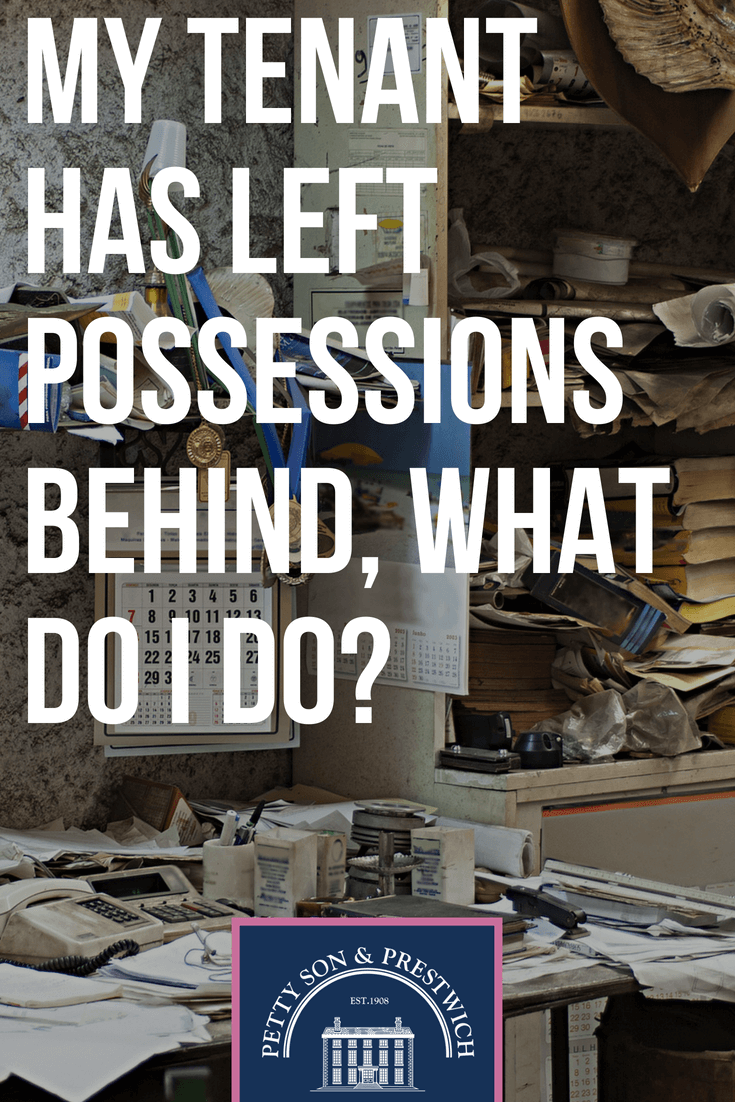While it doesn’t happen often, landlords may, on occasion, find that their previous tenants have left some personal possessions in their property after a tenancy comes to an end. It is often the case that these items are of no significant value, but where do you stand as a landlord? Do you have a responsibility to keep any uncollected goods found on your property? Let’s take a look.
What the law states
As one would expect, there are laws covering such instances, and yes, landlords do have a responsibility for the safe keeping of any items left behind. While this may seem odd, and no little burden for the landlord, it is a relatively rare occurrence and one that should be viewed as part and parcel of the rental business.
When a tenant leaves goods behind – either after a tenancy ends or if they abandon the property – the landlord is deemed to be an ‘involuntary bailee’ pending collection. The Torts (Interference with Goods) Act 1977, gives the tenant further protection, but this can also be used to cover the landlord, too, providing the appropriate action has been taken and logged.
Under the Torts (Interference with Goods) Act 1977, landlords can sell any goods that may have been left behind so long as they have made a reasonable effort to track down the owner of the items before doing so. If the previous tenant is found, landlords must then issue a notice of their intention to dispose of the goods prior to proceeding. Details of how to collect said goods and the fact that storage and disposal will incur costs must also be disclosed within the notice. The costs, however, will not start until the notice period has expired.
Consent from the tenants must be obtained before any goods can be disposed of. Providing you sufficiently carried out all of the necessary checks on the tenant prior to them entering your property and gathered information regarding points of contact, tracing old tenants (or, at least, a family member) shouldn’t be an issue – even if they’ve abandoned the property.
As a side note, fully abandoned properties have further legal implications as it could be deemed as an indication that the tenant intends to return at some point in the future. Landlords who find themselves in such a situation should refer to the Protection from Eviction Act 1977.
How long do I need to keep the goods for?
Under strict adherence to the Torts (Interference with Goods) Act 1977, landlords would seem to need to keep any possessions left in the property for three months. However, the idea behind the act was to cover individuals who placed their possessions in the hands of others, such as putting a high value item in for repair, for example.
In such instances, charges would be made for the repair of the goods in question and, at times, these charges may prove to be too expensive for the owner to cover there and then. Therefore, the act was brought in to allow time for the owner to obtain the funds needed to cover the cost of the repairs.
Tenancies take on a different element, however, and your initial agreement with the tenant should state a reasonable notice period regarding such issues. As a general rule, 14 days is usually deemed to be plenty of time for the notice to be recognised before you can legally dispose of or sell the tenants left possessions.
Can goods be withheld to cover outstanding debt?
In short, no. That being said, if a tenant does leave behind possessions whilst owing you money, you can use the proceeds of the sale of such goods to pay down the debt providing you have followed all of the necessary procedures to get to the point of sale.
The law states that you must also do all that you can to receive the best price possible for any goods left in your possession and that you return any excess funds to the tenant once any debt and your costs have been cleared. Make sure you keep all documentation surrounding the sale of goods, including any valuations you had done on the items prior to selling.
What happens if I cannot trace the tenant?
If you cannot find the tenant after they have left possessions in your property, you are allowed to dispose of or sell the items. However, it is absolutely vital to take all possible measures to trace the old tenant and keep accurate logs of how you tried to do so in order to remain compliant with the law.
Final thoughts
While all this may seem like a major headache, it’s important to reiterate that such occurrences are extremely rare. The majority of tenancies end without a hitch and your property will be left clear and ready for your next tenant to arrive.
If you need any help or advice regarding letting your property, our team are ready to take your call. Get in touch today on 020 8989 2091 or email – This email address is being protected from spambots. You need JavaScript enabled to view it.


As Petty’s MD, John steers the ship. He is, however, first to admit that the team around him run the show, and he’s incredibly proud of each and every one of them. Sporty and studious, caring and loyal, John is a father of two wonderful children (and Cooper the dog).
020 3370 8784 / Email Directly